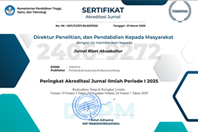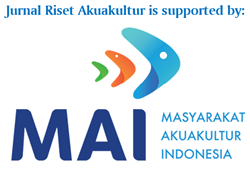PERFORMA PERTUMBUHAN DAN RESPONS IMUN IKAN LELE (Clarias sp.) DENGAN PEMBERIAN PROBIOTIK, PREBIOTIK, DAN SINBIOTIK
Abstract
Penerapan sistem budidaya intensif seringkali dihadapkan pada penurunan performa pertumbuhan dan kejadian infeksi penyakit. Upaya untuk meningkatkan status kesehatan ikan agar dapat tumbuh dengan baik dan tahan terhadap serangan penyakit sangat diperlukan. Penelitian ini dilakukan untuk mengevaluasi pengaruh pemberian probiotik Bacillus sp. ND2 dan prebiotik madu terhadap performa pertumbuhan dan respons imun ikan lele (Clarias sp.). Ikan lele dengan bobot awal 20,94 ± 1,13 g dipelihara pada akuarium volume 60 L dengan kepadatan 15 ekor per akuarium. Ikan diberi empat jenis pakan yaitu pakan kontrol (+) dan (-) (tidak ada penambahan Bacillus sp. ND2 dan madu), probiotik Bacillus sp. ND2 1%; prebiotik madu 0,5%; dan sinbiotik (Bacillus sp. ND2 1% + madu 0,5%). Setelah 45 hari masa pemeliharaan, 10 ekor ikan dari masing-masing akuarium diuji tantang dengan A. hydrophila 107 cfu mL-1 kecuali kontrol (-). Hasil penelitian menunjukkan bahwa ikan yang diberi sinbiotik memiliki nilai laju pertumbuhan harian (LPH) paling tinggi (3,00 ± 0,04%) dan nilai feed convertion ratio (FCR) paling rendah (1,00 ± 0,01) (P<0,05). Aktivitas lisozim (52,59 ± 2,57 UI mL-1 menit-1) dan respiratory burst (0,61 ± 0,05) menunjukkan nilai yang paling tinggi pada perlakuan sinbiotik (P<0,05). Ekspresi gen IL-1b meningkat pada perlakuan prebiotik (1,25 ± 0,10) pada hari ke-45. Semua perlakuan menunjukkan peningkatan ekspresi pada hari ke-52 dengan nilai tertinggi pada perlakuan sinbiotik (5,50 ± 2,77). Perlakuan sinbiotik memiliki sintasan yang paling tinggi (86,67 ± 5,77%) setelah diuji tantang dengan A. hydrophila. Aplikasi sinbiotik (Bacillus sp. ND2 1% dan madu 0,5%), mampu meningkatkan performa pertumbuhan, respons imun, serta resistensi ikan lele terhadap A. hydrophila.
Intensive aquaculture system is continually challenged with some problems such as a decrease in growth performance and disease infection incidences. A substantial effort is needed to improve fish health status to improve the growth performance and disease resistance of cultured fish. To overcome the problems, a feeding trial was conducted to investigate the effects of dietary Bacillus sp. ND2 and honey on the growth performance, immune responses, and disease resistance of Clarias sp. Fish with an initial body weight of 20.94 ± 1.13 g were fed with four practical diets: control diet (+) and (-) (no addition of Bacillus sp. ND2 and honey), probiotic Bacillus sp. ND2 1%, prebiotic honey 0.5%, and synbiotic diets (Bacillus sp. ND2 1% + honey 0.5%). After 45 days of feeding experimental period, ten fish per aquarium were challenged with A. hydrophila except for control (-). The results showed that fish fed with synbiotic produced the highest specific growth rate (SGR) (3.00 ± 0.04%) and had the lowest feed conversion ratio (FCR) (1.00 ± 0.01) which were significantly different from the control (P<0.05). The immune assay showed that fish fed with synbiotic produced the highest lysozyme activity (52.59 ± 2.57 UI mL-1 minute-1), respiratory burst activity (0.61 ± 0.05) which were significantly different from the control groups (P<0.05). The fish IL-1b gene expression was enhanced in prebiotic (1.25 ± 0.10) treatment at the end of the culture period. All treatments showed the enhancement of IL-1b gene expression at the end of A. hydrophila-challenge test, with the highest value attained by fish treated with synbiotic treatment (5.50 ± 2.77). Fish fed with synbiotic diet showed the highest survival rate (86.67 ± 5.77%) after seven days infected with A. hydrophila. In conclusion, synbiotic treatment (Bacillus sp. ND2 1% and honey 0.5%) could improve growth performance, immune responses and disease resistance of Clarias sp. against A. hydrophila infection.
Keywords
Full Text:
PDFDOI: http://dx.doi.org/10.15578/jra.13.4.2018.329-336

















